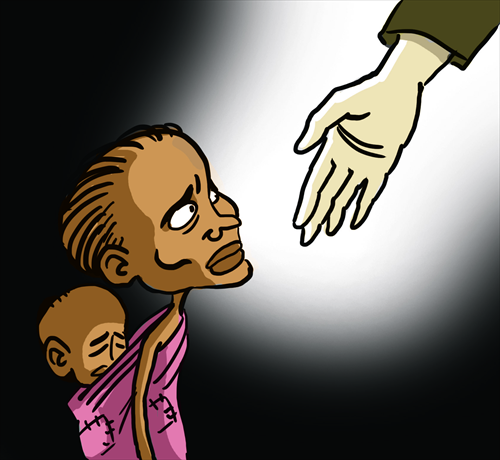HOME >> OP-ED
Li’s trip further builds Sino-African ties
Source:Global Times Published: 2014-5-11 23:13:01

Illustration: Liu Rui/GT
Chinese Premier Li Keqiang concluded his four-nation African tour Sunday. This is Li's first visit to the continent since he assumed office as premier and also his first overseas travel this year.
Half a century ago, then premier Zhou Enlai's maiden tour to 10 African nations from December 1963 to February 1964 laid a solid foundation for Sino-African friendship and fraternity. Now Li's journey to Ethiopia, Nigeria, Angola and Kenya further consolidates the existing achievements, ushering the bilateral ties into a new phase of development.
During Li's visit, his delegation members and their African counterparts inked nearly 60 documents of development aid as well as cooperation projects on trade and investment. The agreements signed between financial institutions and corporations involve energy resources, manufacture, agriculture and infrastructure. Li also attended the 24th World Economic Forum on Africa in Abuja, Nigeria. Therefore, the economy dominates Li's African tour this time, with an aim to forge an upgraded version of Sino-African fraternal ties.
China has been the biggest economic partner of Africa for five years in a row and Nigeria and Angola are among the first ranks of Beijing's African trading partners. China has provided enormous assistance to launch projects across the continent for decades and such aid has gradually taken on a new form in recent years.
Since 2000 in particular, Beijing has implemented programs with commercial loans and signed agreements with some African nations, including Angola, Ethiopia and Equatorial Guinea, to carry out projects in exchange for natural resources.
These programs, covering a wide array of infrastructure, agriculture, education, transportation, energy, communications, and health under business pacts, have won the hearts and minds of the people on this once poverty-stricken and backward continent.
As a fast growing continent in the world, Africa has seen an economic growth rate of more than 5 percent and 6 to 7 percent in one third of African nations. Such a robust momentum of development calls for higher standards in a myriad of cooperation projects.
Hence, China has been enhancing trade and investment in complementary areas over the past decade, with increasing contribution to resources and manufacturing industries. Five out of the six China-aided economic cooperation zones, including the Oriental Industrial Park in Ethiopia and the Ogun Guangdong Free Trade Zone in Nigeria, are in operation, each with 20 to 30 Chinese manufacturing firms involved.
Beijing's industrial structure fits Africa's economic demand. China, as a significant hub of labor-intensive industry, imports energy and natural resources from the African continent to process and then sells manufactured products to the rest of the world. This has long been a major impetus for close relations between China and Africa.
Meanwhile, Beijing exports practical and affordable goods to the massive African market and is now considering transferring some low-end manufacturing industries like toys, apparel and shoemaking to capable African countries, in a bid to further beef up its economy.
China has turned Africa into an attractive and vibrant region from what was a "hopeless continent" in the eyes of most Westerners just a decade ago.
During the past more than 30 years, Africa has been neglected by the West and seldom listed on the agenda of diplomatic priorities of major powers. However, sensing its economic vigor and diplomatic clout thanks to the large number of 54 countries and around 1.1 billion people, Western countries have started to explore its potential to serve their interests.
Japanese Prime Minister Shinzo Abe pledged to promote Tokyo's economic and security cooperation with Africa while traveling there in early January. And Washington also eyes its huge market and longs to become a free rider in this development course. US President Barack Obama proposed several new initiatives for his Africa policy in hopes of regaining the US influence upon this long-ignored continent.
Nevertheless, the economic and trading structures of such developed states are somewhat alien to Africa's status quo.
The vast continent with incredible potential is becoming another arena of competition among traditional powers led by the US and its allies and emerging economies notably China.
Li's weeklong visit demonstrates Beijing's multidimensional foreign policy as well as the willingness for peaceful competition with other nations in Africa.
The article was compiled by Global Times reporter Wang Xiaonan, based on an interview with Tang Xiaoyang, a research fellow in African studies with the Institute of Modern International Relations, Tsinghua University. wangxiaonan@globaltimes.com.cn
Posted in: Viewpoint